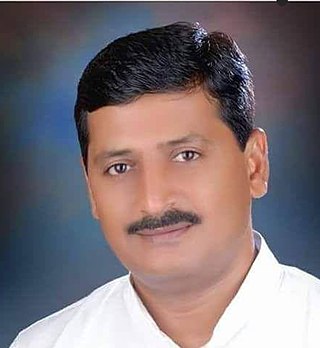
The Unlawful Activities (Prevention) Act is an Indian law aimed at prevention of unlawful activities associations in India. Its main objective was to make powers available for dealing with activities directed against the integrity and sovereignty of India. The most recent amendment of the law, the Unlawful Activities (Prevention) Amendment Act, 2019 has made it possible for the Union Government to designate individuals as terrorists without following any formal judicial process. UAPA is also known as the "Anti-terror law".
The 2009 Gojra riots were a series of attacks targeting Christians in Gojra town in Punjab province of Pakistan. These resulted in the deaths of eight Christians including a child.
The 1990 Hyderabad riots were a series of riots that occurred in Hyderabad of Telangana, the then Andhra Pradesh state of India in 1990. The riots left about 200–300 people dead and thousands injured.
There have been several instances of religious violence against Muslims since the partition of India in 1947, frequently in the form of violent attacks on Muslims by Hindu nationalist mobs that form a pattern of sporadic sectarian violence between the Hindu and Muslim communities. Over 10,000 people have been killed in Hindu-Muslim communal violence since 1950 in 6,933 instances of communal violence between 1954 and 1982.

Najeeb Ahmed was a student of JNU New Delhi, India, who went missing from his hostel on the university campus under suspicious circumstances on 15 October 2016.

Umar Khalid is an Indian student activist, a former research scholar at Jawaharlal Nehru University, former leader of Democratic Students' Union (DSU) in JNU. He was allegedly involved in the Jawaharlal Nehru University sedition row and is an accused under the UAPA law. Khalid is also associated with United Against Hate, a campaign founded along with Nadeem Khan in July 2017 in response to the series of lynchings.
The Citizenship (Amendment) Act, 2019 (CAA) was passed by the Parliament of India on 11 December 2019. It amended the Citizenship Act, 1955 by providing an accelerated pathway to Indian citizenship for persecuted religious minorities from Afghanistan, Bangladesh and Pakistan who arrived in India by 2014. The eligible minorities were stated as Hindus, Sikhs, Buddhists, Jains, Parsis or Christians. The law does not grant such eligibility to Muslims from these countries. The act was the first time that religion had been overtly used as a criterion for citizenship under Indian law, and it attracted global criticism.

The Citizenship Amendment Act (Bill) protests, also known as the CAA Protest, CAB Protest or CAA and NRC protests, occurred after the Citizenship Amendment Act (CAA) was enacted by the Government of India on 12 December 2019. The move sparked a widespread national and overseas ongoing protests against the act and its associated proposals of the National Register of Citizens (NRC). The protests first began in Assam and spread swiftly in other states such as Delhi, Meghalaya, Arunachal Pradesh, and Tripura on 4 December 2019. Protests broke out rapidly across the country, although the concerns of the protesters vary.

The Jamia Millia Islamia attack refers to the forceful entry by Delhi police into the Jamia Millia Islamia university during a confrontation with student protesters that started outside the campus on 15 December 2019. Hundreds of police officers forcefully entered the campus and detained more than a hundred students during the confrontation with the protesters. The police used batons and tear gas to disperse protesters. The police also entered the university library and washrooms and in the process of the violence ransacked parts of it. The visuals of students being dragged and assaulted by the police were telecast by news channels. About two hundred people were injured and were admitted to AIIMS and the Holy Family Hospital.

The 2020 Delhi riots, or North East Delhi riots, were multiple waves of bloodshed, property destruction, and rioting in North East Delhi, beginning on 23 February 2020 and brought about chiefly by Hindu mobs attacking Muslims. Of the 53 people killed, two-thirds were Muslims who were shot, slashed with repeated blows, or set on fire. The dead also included over a dozen Hindus, who were shot or assaulted. More than a week after the violence had ended, hundreds of wounded were languishing in inadequately staffed medical facilities and corpses were being found in open drains. By mid-March many Muslims had remained missing.
Safoora Zargar is an Indian student activist leader from Kishtwar, Jammu and Kashmir, best known for her role in the Citizenship Amendment Act protests.
Sharjeel Imam is an Indian student activist from Kako village of Jehanabad, Bihar. He had completed his B.Tech. and M.Tech. from IIT-Bombay and joined Jawaharlal Nehru University in 2013 for completing his master's degree in Modern History and in 2015 he started Ph.D. from the same university. He is known for his allegedly inflammatory speeches made during anti-Citizenship Amendment Act (CAA) protests which led to his arrest under sedition.
Meeran Haider is an Indian activist leader and human rights defender known for his role in Citizenship Amendment Act protests. He is also the RJD State President of Delhi youth wing unit.

Asif Iqbal Tanha is an Indian student activist, a former student of Jamia Millia Islamia and a member of Students Islamic Organisation of India. He was allegedly involved in the Delhi Riots conspiracy case and is an accused under the UAPA Act. Tanha is also associated with United Against Hate (UAH), a campaign that was started in July 2017 in response to the series of lynchings and hate crimes in India.
Hindus for Human Rights is a U.S.-based non-profit advocacy group founded in 2019. The organization supports pluralism, civil rights, and human rights in South Asia and North America and focuses on providing a Hindu voice of resistance to caste, Hindutva, racism, and all forms of bigotry and oppression.

Association for Protection of Civil Rights is a non-governmental organization which was established in 2006 for the protection of human rights of the exploited-deprived sections of the society. It is composed of advocate, social activities and grassroots paralegal social workers.

Er. Mamman Khan is an Indian politician from the Indian National Congress, who was elected as a member of the Haryana Legislative Assembly representing the Ferozepur Jhirka constituency in the Nuh district of Haryana.
On 8 February 2024, violent clashes erupted in Haldwani, Uttarakhand, following the court-ordered demolition of an unauthorised madrasa and mosque situated in the Banbhoolpura area, predominantly inhabited by Muslims. Rioters hurled stones at law enforcement officers, set vehicles ablaze, and deployed petrol bombs during the tumultuous events.








